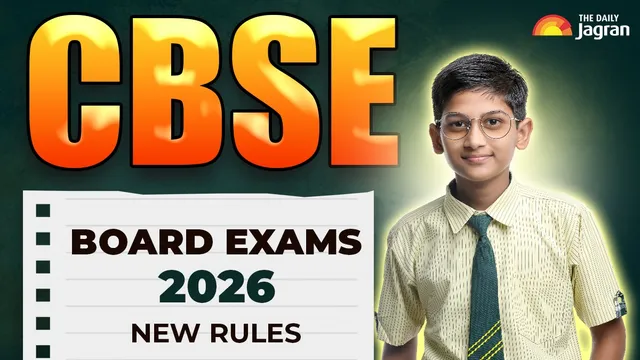- By Sarju Saran Tiwari
- Thu, 18 Sep 2025 07:51 PM (IST)
- Source:JND
CBSE Board Exams 2026: The Central Board of Secondary Education (CBSE) has, in the past few months, announced significant new changes in the board examinations 2026. These rules will impact students and educators across India. These comprehensive reforms aims to modernise the education system and provide more flexible learning opportunities. Here are some pointers on the changes made by CBSE.
1. Major Examination Structure Reforms:
In an official announcement, CBSE clarified the following reforms:
Two-Term Examination System for Class 10:
Starting from 2026, CBSE will implement a revolutionary two-term examination system for Class 10 students. The first 'main' board examination will be conducted in mid-February 2026, followed by a second examination in May 2026. This system is designed to reduce exam pressure and provide students with multiple opportunities to demonstrate their knowledge.
Two-Level Subject Offerings:
CBSE plans to extend its two-level system (basic and advanced) beyond Science and Social Science at the secondary stage. Starting with Class 11 in the 2026-27 academic session, STEM subjects at the higher secondary level will also be offered at two different difficulty levels, allowing students to choose based on their aptitude and career aspirations.
Open-Book Assessments for Class 9:
A groundbreaking change comes with the introduction of Open-Book Assessments (OBAs) for Class 9 students beginning in the 2026-27 academic session. The Central Board of Secondary Education (CBSE) is set to introduce Open-Book Assessments (OBAs) for Class 9 students beginning with the 2026-27 academic session. The plan, cleared by the board’s Governing Body in June, follows a pilot study that was conducted in late 2023 across select schools for Classes 9 to 12.
2. Attendance and Academic Requirements
Mandatory 75% Attendance Rule
The Central Board of Secondary Education (CBSE) on August 4 issued a fresh directive reiterating the mandatory requirement of 75 per cent attendance for students appearing in the Class 10 and 12 board examinations in the 2025-26 academic session.
Removal of Additional Subject Option for Private Candidates
The CBSE has done away with the option of allowing private candidates to take an exam in ‘additional subject’ from 2026, in a move that students said they should have been informed about earlier in the year. A senior CBSE official said the option of taking an ‘additional subject’ as a private candidate has been removed since the board is not only about appearing for an exam, but also about schooling.
3. Sports and Special Talent Provisions
Enhanced Support for Sports Students
The Central Board of Secondary Education (CBSE) has announced special provisions for students of Classes 10 and 12 who are representing India in national or international sports events or international Olympiads.
For Class 10 students, under the new two-exam policy – first in February 2026, second in May 2026- sports students can only take special exams during the second cycle in May. No separate examination will be held after the first cycle. Students must fill out the LOC (List of Candidates) for the main exam as usual. In case of compartment students, exams will be conducted in February or March 2026
For Class 12, policy remains unchanged. If the main Board examination clashes with a recognised event, CBSE will re-conduct the exam after the main exam cycle.
4. Infrastructure and Wellness Initiatives
Mother Tongue Education Policy:
The Board has also asked schools to map students’ mother tongues and stated that, from pre-primary to Class 2, teaching should be in the child’s mother tongue or a familiar regional language.
Also Read: TNPSC Group 2 Hall Ticket 2025 Released At tnpsc.gov.in, PDF Download Link Here
Enhanced Security Measures:
The Central Board of Secondary Education (CBSE) has updated its affiliation norms to include a new provision mandating the installation of high-resolution CCTV cameras with audio-visual recording capabilities across all key areas of school campuses. This amendment has been made under Chapter 4, which deals with physical infrastructure requirements for affiliated schools.
Health and Nutrition Awareness:
The Central Board of Secondary Education (CBSE) on May 14 directed all its affiliated schools across India to establish dedicated ‘sugar boards’ within their campuses. The move is part of a broader nationwide awareness and intervention strategy to reduce excessive sugar consumption among school-going children.
Digital Content Development:
CBSE board has initiated the in-house development of educational podcasts and digital content focusing on academic and counselling-related matters. According to an official statement, the content is being prepared to provide meaningful guidance, awareness and support to students, parents and schools.
These comprehensive changes represent CBSE's commitment to creating a more holistic, flexible, and student-friendly education system. Students and educators should prepare accordingly for these significant reforms that will shape the future of secondary education in India.

